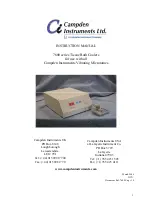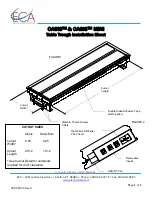
1-1
PRODUCT INFORMATION
CAUTION: Contact with the test leads on this equipment can cause
harmful or fatal electrical shock. Do not touch test leads while a test is in
process.
SAFETY AND CAUTION NOTES
1. Contact with the test leads on this equipment can cause harmful or fatal electrical shock. Do
not touch test leads while a test is in process.
2. Insure that the tester is properly grounded before proceeding with a test.
3. Turn the tester off before reaching inside. Damage to the tester and hazardous shock to
personnel will result if this procedure is not followed.
4. Insure that the equipment to be tested is de-energized and properly isolated.
5. Insure that the equipment to be tested has been properly grounded using a hot stick and
rubber gloves.
6. Insure that barriers and warning signs are erected in order that personnel in the test area are
protected. Use an assistant operator where appropriate to keep non-essential personnel
away from the test site.
7. When testing cables, the conductors at the distant end should be isolated from each other
and taped.
8. When testing a faulted cable, it is advisable to first make an insulation resistance measure-
ment before proceeding with the high voltage test.
9. Use care to avoid damaging the tester during disassembly and reassembly procedures.
10. This unit should only be operated by someone familiar with high voltage testing and safety
procedures.
DESCRIPTION
The PM6 tester is capable of producing voltages as high as 6 kV DC into a variety of insulated
electrical apparatus. The unit will measure leakage current flow through (or insulation resistance
levels of) the ground insulation of the test sample. Leakage current as low as .01 microamperes
DC (.1 milliamperes AC) and as high as 5000 microamperes DC can be read directly from the
testers front panel meter. Insulation resistance values up to 1,000,000 megohms may also be
read directly at test voltages of 2.5 or 5 kV DC (a factor scale for insulation resistances at other
test voltages is also provided).






































